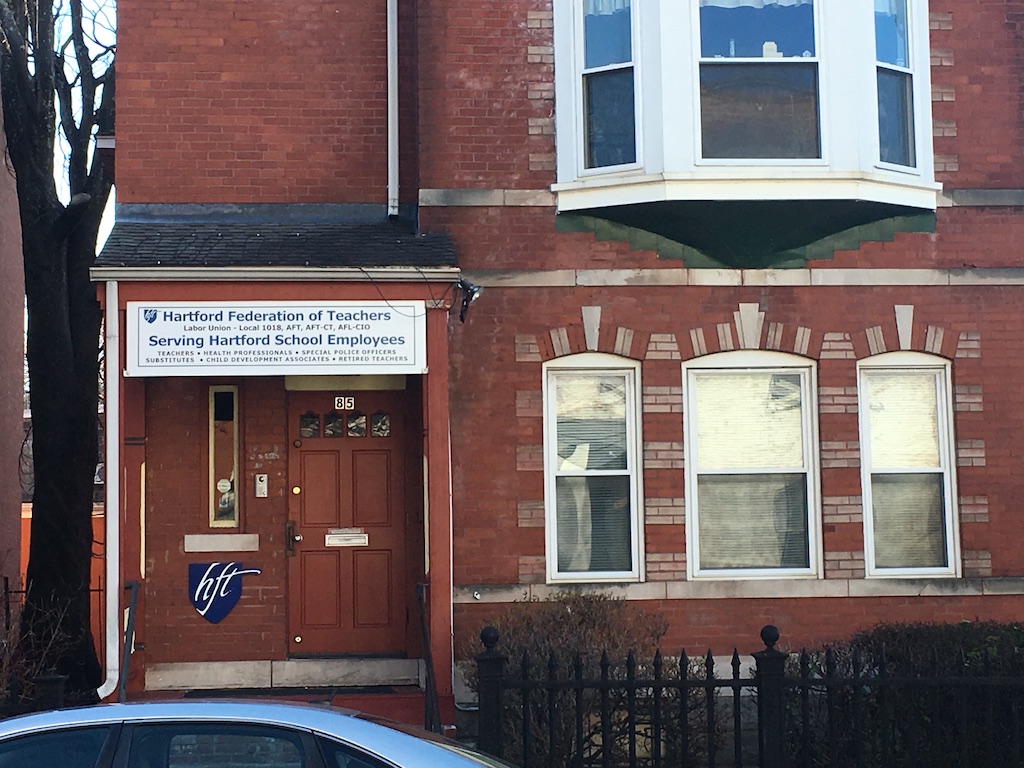The Hartford Federation of Teachers, AFT, is fighting a multi-year court battle with its own unionized office employees over wage and retirement benefits, pitting the teachers’ union against its own affiliate organization, the AFL-CIO.
At issue is the severance package owed to HFT office employees under their collective bargaining agreement with the teachers’ union. The four office employees are part of the Office and Professional Employees International Union AFL-CIO and, according to their contract, are owed unused vacation time when they separate from employment.
When James Howe – an employee of nearly 15 years – retired in 2016 he calculated the teachers’ union owed him $87,908 based on the formula provided in OPEIU’s contract, according to a press release sent by attorney for the plaintiffs, William Ward.
HFT denied Howe’s compensation and offered $5,838.14, according to court documents.
Howe filed a grievance with the Connecticut State Board of Mediation and Arbitration in 2016 on behalf of himself and his coworkers to uphold the vacation payout formula in the contract.
In 2017, the arbitration panel ruled in favor of Howe and the office employees, saying the teachers’ union violated the union contract and ordered HFT to pay Howe the $87,908.
However, HFT took the matter to superior court, arguing that the issue was never subject to arbitration in the first place – something they never raised during the arbitration hearings in 2016 and 2017 – and asked that the state board decision be vacated.
The case went through several judges, and, finally, Superior Court Judge Cesar Noble ruled against HFT and upheld the arbitration decision.
On Christmas Eve of 2019, however, HFT filed the case with the state’s appellate court.
William Ward, attorney for the plaintiffs, says the teachers’ union is essentially biting the hand that feeds it by fighting an arbitrated decision.
They’re a labor union for teachers and they’re trying to undermine the arbitration board. Someday, this may come back and bite them.
William Ward, Attorney for the Plaintiffs
“They’re a labor union for teachers and they’re trying to undermine the arbitration board,” Ward said. “Someday, this may come back and bite them.”
“How can the HFT fairly represent their own members when it refuses to show any respect, dignity and professionalism toward its own OPEIU members?” the press releases states. “The financial cost to HFT must be significant as they have had a high-priced attorney from the beginning.”
Grievance arbitration allows unions to take contract issues between an employer and employee to a neutral party or panel to get a ruling, thus avoiding court. Union leaders are vociferous in their support for the ability to arbitrate contract issues and union contracts contain detailed rules as to how arbitration is handled.
When a contract is signed, both parties – the union and the employer – agree to follow the decision of an arbitrator, and Connecticut’s court system has a long history of upholding grievance decisions made by arbitrators.
Critics say the process prevents the state from terminating bad employees, essentially tying the employer’s hands.
Most famously, a UConn Health Center employee was caught by police smoking marijuana during his work shift and was terminated. The employee’s union filed a grievance and an arbitrator ruled the employee could not be terminated under the terms of his contract. The State of Connecticut took the case all the way to the Connecticut Supreme Court and lost.
But the arbitration process can prevent expensive and time-consuming court cases over contract issues.
The Hartford teachers’ union is not the only employer dealing with vacation payouts – the City of Hartford has a history of making large vacation payouts to retiring employees, sometimes topping $200,000. The city has been trying to limit those payouts in new contracts with its unions.
However, city employees have a pension package for their retirement; the office employees at HFT do not.
Beginning in 2008, the four office employees were given a small defined contribution plan into which HFT would deposit $3,100 annually toward each employee’s retirement account.
The office employees can contribute part of their pay, but the union does not match that contribution and often fails to make the $3,100 payment in a timely manner, according to sources inside the union’s headquarters.
Before 2008, however, the employees largely relied on their vacation payout for any retirement income and the severance payout was grandfathered into new contracts for existing employees.
HFT is trying to avoid those payouts with a long and costly court battle – which they have lost every step of the way, thus far.
According to the press release, the plaintiffs believe that a ruling in favor of the HFT would undermine collective bargaining throughout the state.
“Because OPEIU believes in labor and all it stands for, they have remained silent on this issue for years,” the press release says. “However, HFT has forced their hand and left OPEIU no option but to go public and reveal how devastating an HFT award in their favor would be against all union members throughout the State of Connecticut.”
The Hartford Federation of Teachers AFT is run by Andrea Johnson, and Rep. Joshua Hall, D-Hartford, serves as first vice-president. Both HFT and the Office and Professional Employees International Union are affiliates of the AFL-CIO.

